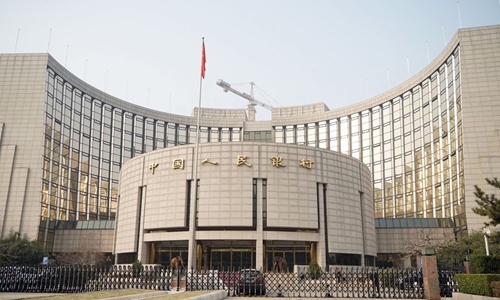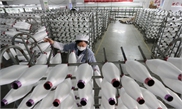
Photo taken on March 13, 2018 shows the headquarters of the People's Bank of China. (Xinhua/Cai Yang)
China should maintain sufficient liquidity and promote reasonable credit growth while support key industries and those hit hard by the novel coronavirus as the economy recovers, according to the architect of the nation's monetary policy.
The economic impact of the coronavirus will be temporary in China as the country's economy has displayed strong resilience and great potential, and the fundamentals of China's development will not alter, said People's Bank of China Governor Yi Gang in an article published in Economic Research Journal.
Yi believes China should keep its leverage ratio as stable as possible to achieve a balance between growth and risk prevention, and leave room for the economy to maintain long-term sustainable growth. Excessive stimulus may exacerbate inflation risks and lead to excessive financial leverage, Yi said.
These comments by Yi indicate that the central bank will try to prevent inflation while take a cautious attitude in cutting benchmark interest rates, Zhao Qingming, an expert in finance, told the Global Times on Monday. "It shows that the central bank wants to keep interest rates steady, and it is unlikely to lower the benchmark deposit rate."
The People's Bank of China has issued a directive calling for an increase in the re-lending and rediscount quotas for small and medium-sized banks to boost lending to the agriculture sector, small and micro-sized enterprises (SMEs), and private enterprises.
The State Council, China's cabinet, will increase the re-lending and rediscount quotas by 1 trillion yuan ($141 billion).
"These targeted measures may ease the financial pressure of SMEs and help them resume operations," Zhao said, adding that future policy may still focus on targeted cuts in bank reserve requirement ratios, re-lending and rediscounting operations.
In his statement Yi highlighted the need to raise the share of direct and equity financing to combat bank debt and to maintain financing for the real economy while stabilizing the leverage ratio.
Yi believes it is necessary to advance reform of the IPO registration system and increase the transparency of the capital market.
For the real estate market, Yi advocates risk management and a long-term mechanism to stabilize land prices, housing prices and expectations, and strengthen the overall monitoring of financing sources.
Property policies should reflect conditions in individual cities and countercyclical macro-prudential policy should be strengthened, he said.
He added that it is necessary to redefine fiscal relationships between the central and local governments, improve local taxation systems, and establish a compliant, regulated, transparent and self-restricted local government debt financing mechanism.



